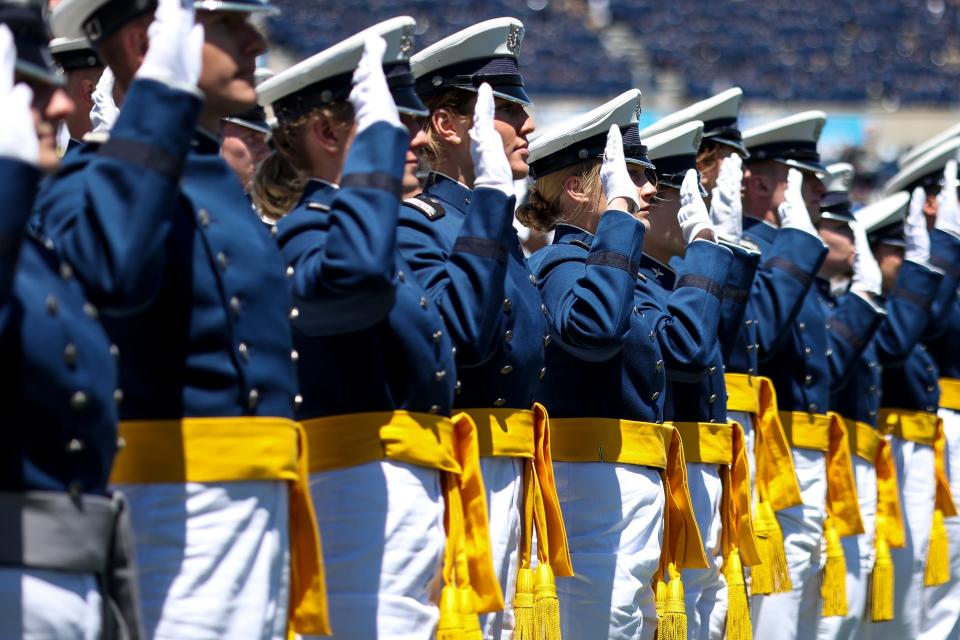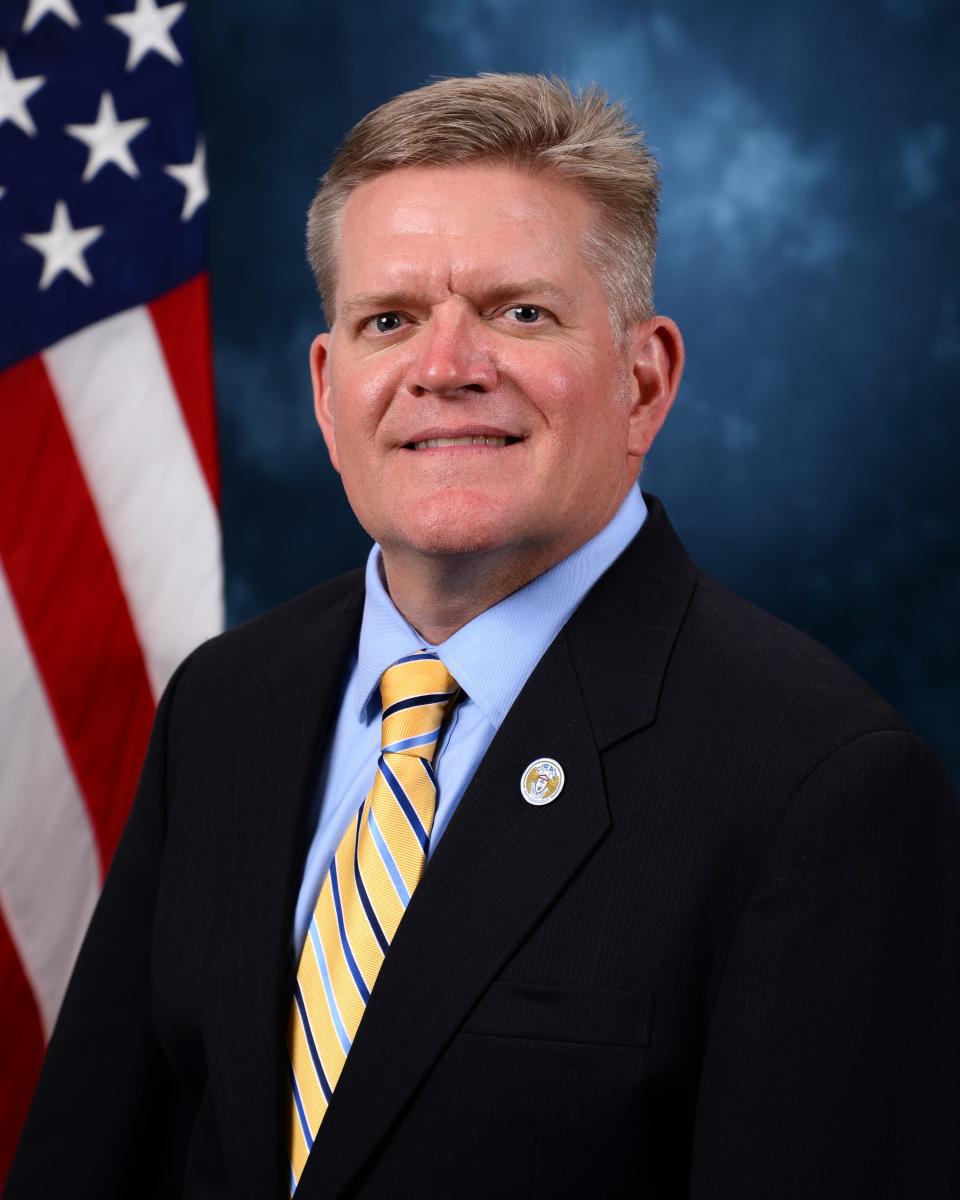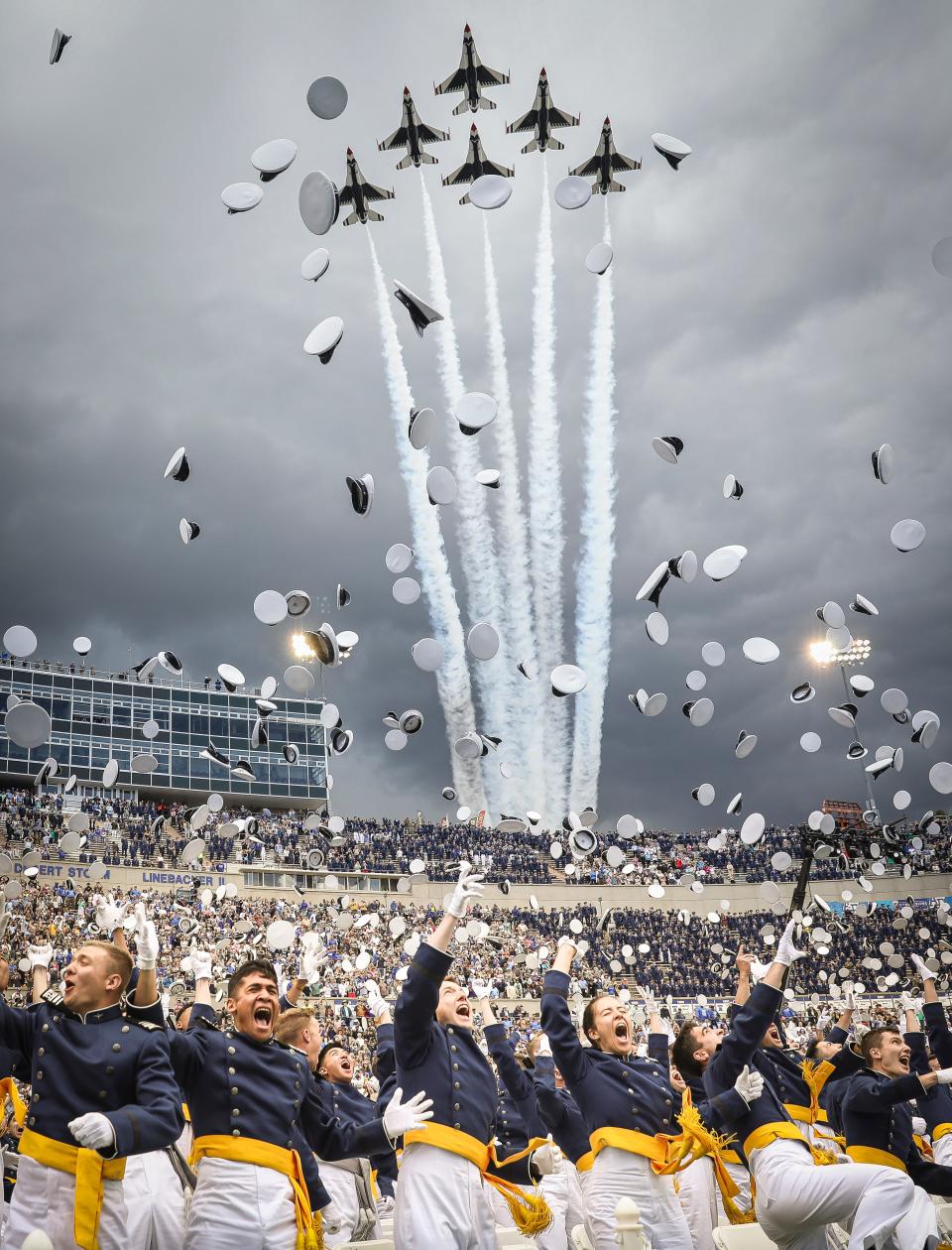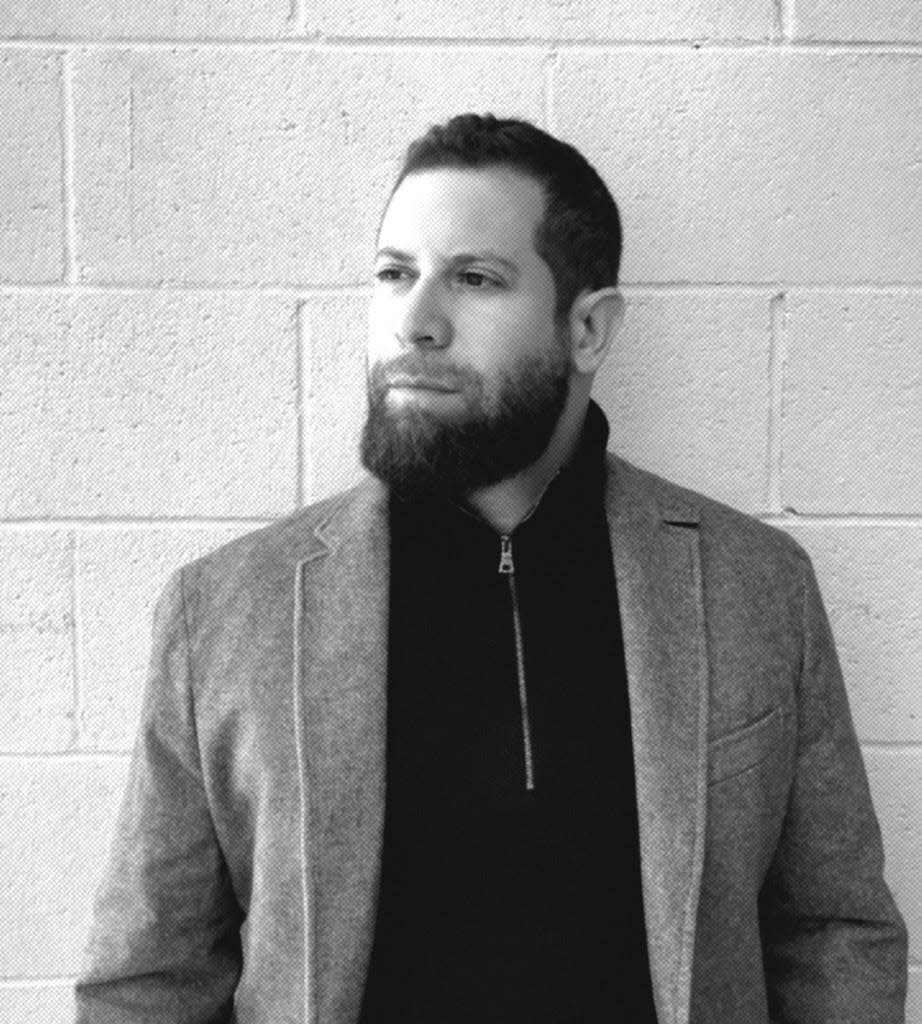To combat bullying and extremism, Air Force Academy turns to social media sleuthing
After years of internal and external alarms that the military isn’t doing enough to address hate and extremism, an obscure federal contract may suggest a new approach: monitoring the social media of Air Force Academy cadets, staffers − and anyone else around the campus.
Last month, the Air Force struck a contract for digital monitoring to identify hate speech, cyberbullying, sexual harassment and extremism at its Colorado Springs academy. The goal is to “combat cadet conduct in digital mediums that has the potential to negatively impact culture and climate.”
Monitoring the posts of the more than 4,000 cadets aligns with efforts elsewhere to screen disinformation and hate speech; other universities plus police agencies and many employers make comparable efforts. But the contract’s extension to the campus community led some experts to raise concerns about whether the effort could violate privacy for military or civilian users.
And while Air Force Officials say there are no plans to replicate the program elsewhere in the military, experts on surveillance worry about the contract’s open-ended wording and sweeping focus.

At $273,500 total, it's unclear just how far-reaching the effort will become. The contract focuses mainly on a social media system used at the school but requires that monitoring shift to other major platforms such as YouTube or TikTok if misconduct shifts to those areas. The contractor, Miami Beach-based 3Gimbals LLC, did not respond to requests for comment.
The program came as a surprise to experts on extremism in the military, including Bishop Garrison, who led a Pentagon working group that made more than 20 extremism-related recommendations for the armed forces in 2021.
“This is not something we covered, and it’s not something I’ve ever heard about happening in the military,” Garrison said. Referencing the constitutional protection from unreasonable searches and seizures, he added: “I think this will need to be thoroughly reviewed because it has the potential to be a Fourth Amendment issue and may potentially infringe on key privacy protections.”
The week in extremism: This social media network set the stage for Jan. 6, then was taken offline. Now it's back
Protecting academy culture, or infringing on constitutional rights?
The social media monitoring contract, which will last one year with a possibility to extend another six months, was awarded Feb. 13, according to the federal government’s System for Award Management website. The effort is part of “a larger cultural concern at the Air Force Academy that is captured under a larger campaign,” said Thomas Torkelson, deputy director of the Air Force Academy’s Center for Character & Leadership Development, who leads the program.

The goal of monitoring social media is to educate cadets, prevent them from spreading harmful material online and respond when someone is posting content that academy leaders consider harmful to the base’s culture, Torkelson said. That includes identifying people who post inappropriately and, if necessary, holding them accountable for any criminal activity witnessed by the monitoring company, he said.
“It’s not about trying to infringe upon First Amendment or Fourth Amendment rights,” Torkelson said. “In fact, it’s trying to protect Fourth Amendment rights.”
Torkelson cited the hypothetical example of a cadet who posts derogatory information about a sexual assault victim on social media. The monitoring program would flag the post so it could be quickly removed, thus protecting the victim’s right to privacy, he said.
The Air Force, like the other branches of the service, has struggled with extremism and online misconduct. A federal affidavit unsealed this week revealed that an Air Force security analyst had been suspected of obtaining classified material and leaking it online, including on the gaming site Discord. While that analyst, Jason Gray, was not apparently an Academy cadet, his case was reminiscent of an even larger case that led to charges against Air Force National Guard member Jack Teixeira. And Gray's interest in the Boogaloo movement, which espouses a second civil war in the U.S., points to larger concerns about how military members can turn their training and classified knowledge toward extremism.
But experts in surveillance have serious concerns about the Air Force Academy’s new approach.
Air Force Academy aims to monitor the Jodel app, a hyperlocal social system
Ryan Shapiro, executive director of the open-government group Property of the People who holds a doctorate from the Massachusetts Institute of Technology focusing on government surveillance, said he’s particularly troubled by the scope and scale of the Air Force Academy’s new contract.

Public documents outlining the program are not precise about who, or what, will be monitored, he said. Monitoring is primarily focused on an anonymous hyperlocal social media site called Jodel, which people on and around the academy can use to make public posts, similar to Reddit. Jodel did not respond to a USA TODAY inquiry about the monitoring effort.
But the contract also allows for the monitoring of “other social media platforms,” according to its Performance Work Statement.
The program also is ostensibly aimed at monitoring the social media activity of cadets, but Torkelson acknowledged that anybody using Jodel or any other social media in the geographical vicinity of the academy also could be targeted.
“The program’s expansive scope reeks of calculated ambiguity,” Shapiro said. “It appears custom-made to serve as a vehicle for the policing of dissent, not just of military personnel but also the broader public.
“That’s deeply disturbing.”
Some Republican members of Congress have criticized the military’s efforts to combat extremism, calling it a witch hunt and a waste of the military’s time and money.
USA TODAY contacted half a dozen Republican members of the Congressional Armed Services Committee − the body responsible for crafting the legislation that funds the military each year − but none would comment for this story.

Shapiro noted the Air Force Academy’s new program isn’t the first time a military establishment has sought to police the speech of personnel. Last year, The Intercept reported on a shadowy Pentagon unit called the Protective Services Battalion, which trawls through social media searching for posts from service members that might embarrass current and former top military brass.
Nor is social media monitoring limited to the armed forces. As USA TODAY reported in 2022, the FBI has in place an extensive social media monitoring program known as SOMEX, which is constantly spying on American citizens and searching for posts that might indicate extremism views or activity.
Matthew Guariglia, a policy analyst at the Electronic Frontier Foundation, said the new Air Force Academy monitoring contract also aligns with efforts by private companies and institutions to keep track of what their employees are posting on social media.
“We are living in a time when employers, schools, and universities are surveilling their employees and students at unprecedented levels which often include, not just emails or internet traffic conducted on company devices, but also social media use including outside of work/school hours,” Guariglia told USA TODAY. “For that reason and considering the attention the military has gotten for extremism in its ranks, it’s not a major surprise that the Air Force Academy would contract a company like this.”
Despite the extent of social media surveillance in American working life, it remains apparently rare within the military ranks – the same group that experts have found are more than twice as likely to become involved in fatal extremist activity.
The Air Force Academy has always been responsible for shaping cadets into well-rounded, responsible members of society, Torkelson said. Today, with social media playing a large role in many people’s lives − especially young people − the academy has to respond to that reality and adjust its policies and procedures to accommodate new societal trends, he said.
“The academy’s mission is to develop leaders of character ready to serve their nation,” Torkelson said. “It’s a character thread that we’re trying to educate them on − what’s the proper way to behave in an anonymous digital space − that’s it.”
But Guariglia noted the same concerns voiced by Shapiro: that the Air Force Academy contract seems extraordinarily open-ended:
“The concern here, as always, is mission creep,” he said, “the idea that a program designed to find serious threats might be used to penalize people for their beliefs, associations or creative expression.”
Monitoring contract will create training for cadets, leadership
The contract for the Air Force doesn’t just cover monitoring. It also calls for training modules for senior academy staff to teach cadets about social media use.
The training should be for 18- to 24-year-olds and focus on all social media platforms, “geared towards 18-24-year olds’ online conduct on all social media platforms,” the Performance Work Statement says, and will be used by about 4,400 cadets.
Torkelson said the training element is a key reason for the social media monitoring. The idea is for 3Gimbals LLC to spend a year tracking what cadets and staff post online, then use the company’s findings to craft its training sessions, two of which will be held throughout the year, he said.
“It’s not about policing, it’s not about rooting out bad actors,” he said. “It’s about educating the entire population on what being a leader of character looks like.”
Shapiro was skeptical.
There are plenty of organizations and companies that already provide social media training for establishments like the Air Force Academy, he said. Indeed, the academy already has an extensive social media guide for cadets.
“Most large corporations and universities have social media trainings for their people, and they don’t include mass surveillance as a requirement of the trainings,” Shapiro said. “It’s quite possible to run a social media seminar without having spied on the entire community first.”
Will Carless is a national correspondent covering extremism and emerging issues. Contact him at wcarless@usatoday.com. Follow him on X @willcarless.
This article originally appeared on USA TODAY: At Air Force Academy, a social media monitoring plan raises questions

